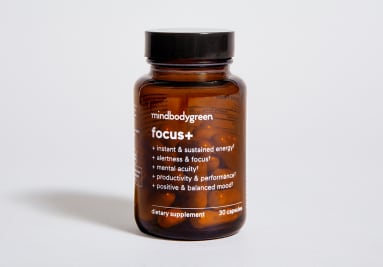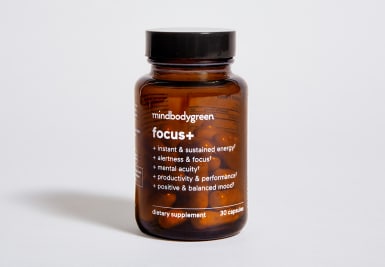Can't Focus? These 8 Tips Will Help Promote Attentiveness & Productivity


If I had a dollar for every time I Googled "why can't I focus?" when I was supposed to be completing assignments during high school, college, and in my writing career, I'd have enough money to pay rent for at least one month (which might not seem like a lot, but rent prices are high these days!).
The point is, I've dealt with my fair share of attention issues, and they've haunted my life at times. Deadlines can make my body feel like it's being chased by a tiger. Sometimes, a deadline glues me to a task; other times, I become stressed out, my eyes shut down, and my mind wanders with a burning desire to do literally anything besides the task at hand.
Advertisement
Struggling to focus, whether it's a new experience for you or something you've been dealing with since the fifth grade (like me), is annoying, overwhelming, and even scary.
You might be asking yourself what is wrong with me? as you read the page of your book three times before you can actually comprehend the information, or your cursor blinks what feels like a million times before you can get yourself to type just one sentence.
The truth is this: Lack of focus is a reality for a lot of people. Whether the phrase why can't I focus? keeps bouncing around your mind or you just need some quick tips to help you write that paper due at midnight, we've put together the perfect advice from experts to help get you back on track.
What causes issues with focus?
According to George Sachs, PsyD, clinical psychologist at the Sachs Center and co-founder of Inflow, focus issues are caused by a variety of factors—including thoughts and feelings that are overwhelming and brain differences (i.e., chemical and/or structural) that make prolonged focus more challenging.
If you're struggling to focus, there's a good chance that your basic cognitive needs aren't being met. Getting in touch with these needs can help you identify the obstacle between you and the task you need to accomplish.
Things that could be affecting your ability to concentrate include lack of restful sleep, hunger, thirst, poor stress management, and even suboptimal gut health.
If any of these are off, it's very common to experience an inability to focus. Taking care of your basic needs can ensure you have the best chances of completing your tasks efficiently and effectively.
In today's sensory-filled world, it's so easy to have difficulty focusing. "Lack of focus can be a byproduct of our digital age when adults are spending four hours a day on their phones and using social media—which is designed to stimulate attention for short periods, habituating us to focus for short periods," says Sachs.
So many different things are begging for our attention. The interconnectedness of our society makes new and exciting information available constantly. And with new information comes the stress of dealing with, thinking about, and being introduced to new issues every time a notification pops up on your phone.
Advertisement
When to see a health care provider about an inability to focus.
Dealing with trouble focusing can be exhausting and overwhelming. While focus concerns are incredibly common and experienced by many at different times throughout their lives, certain challenges may require more attention.
Sachs suggests seeing a health care provider if your struggle to focus is significantly affecting your daily life—like your personal relationships or ability to complete work for school or your job.
When your inability to focus is paired with a lack of motivation, unusual tiredness, or difficulty getting restful sleep, it may be a good idea to let your doctor know. Seeing a health care provider about an inability to focus can be a good step to improving your daily life. "As being unable to focus is merely a side effect, knowing the origin of the cause is essential to improve focus," says clinical psychologist Janina Elbert, Ph.D.
How to improve focus.
Let's figure out how to focus better (because honestly, if you're reading this article, we both know there's probably some task or assignment you need to be getting back to). Here are some long-term and short-term solutions that you can put into practice ASAP:
Advertisement
Get more sleep.
New York Times bestselling author Johann Hari recently shared on the mindbodygreen podcast that the No. 1 way to increase your attention span is to sleep more. Sleep is incredibly restorative and an essential time for your brain to wash out all of the metabolic waste that builds up during the day. When you don't get enough sleep, that lack of restoration can result in poor concentration and shortened attention span.
Take care of your basic needs.
This can include aiming to eat nutrient-dense and flavorful meals and snacks (Sachs suggests trying the Mediterranean diet) and staying hydrated.
If you can't focus right now, try pouring yourself a big glass of water or other hydrating beverage—for extra stimulation, try very cold or flavored water. Other immediate remedies could include taking a nap or eating a snack.
Advertisement
Try a supplement like mbg's focus+.
If you want to leverage targeted nutrients and plant power from Mother Earth herself, a clean supplement filled with brain-supporting bioactives could be exactly what you need. mindbodygreen's focus+ is an innovative, plant-driven nootropic supplement that delivers sustained energy and focus.*
In just one capsule, this optimized complex harnesses the unique power of six ingredients that support the energy of our cells, mind, and body: instant caffeine from whole coffee fruit, sustained-release caffeine from green coffee beans, Panax ginseng root, guarana seed, L-theanine, and vitamin B12 (in its bioactive methylcobalamin form, mind you).*
Enjoy some movement.
Any sort of movement serves as a welcome break for your brain, and a break is sometimes just the thing you need to be more productive. Moving your body helps support your memory and cognitive function. A 2020 review from Translational Sports Medicine even found that just two minutes of higher-intensity movement improves focus for an hour!
Advertisement
Meditate.
Sachs, Elbert, and many other experts recommend meditating to aid in concentration. Sahaja yoga meditation specifically has been found to reduce mental chatter and strengthen both focus and control, but here's a breakdown of the 12 major meditation styles, if you're curious.
Turn off your phone.
The quick scroll of Instagram for a few moments during work distracts you more than you think. In fact, research shows that it takes 23 minutes to get back on track after a distraction. So, do yourself a favor and put your phone on "do not disturb" or even airplane mode, and make sure it's out of reach.
Use the Pomodoro Technique.
This method breaks up your work into 30-minute segments: 25 minutes of working and then a five-minute break. Many people report better productivity and ability to concentrate with this structure. There are even apps that can help you follow the schedule (or websites, if you want to avoid picking up your phone during those 25 minutes).
Turn up the tunes.
OK, hear me out—a few years ago, teens all over TikTok started listening to songs from the Mario Kart soundtrack while doing schoolwork, and I've sworn by it ever since. Check out YouTube for some fast-paced playlists that'll make working feel more like gaming.
If Mario Kart isn't your style, not to fear—any background music of your choice will do! A 2021 study from Psychological Research found that listening to preferred background music enhances a task-focused attentional state1.
So, it doesn't matter if you're listening to Mozart, Adele, EDM, Marvel film scores, or Mario Kart—as long as it helps you focus, it's the right music style to optimize your overall productivity.
The takeaway.
Each of us has our own struggles when it comes to completing tasks and promoting focus in our modern distraction-ridden world. The thing to remember is that it's totally normal, and many solutions are both accessible and effective.
At the end of the day, the inability to focus is the body's way of telling us a need isn't being met and something needs to change. All you can do is respect those needs and set up your own system of fulfilling them so everyday life can be a little bit easier.

Josey Murray is a freelance writer focused on inclusive wellness, joyful movement, mental health, and the like. A graduate of Wellesley College, where she studied English and Creative Writing, her work appears in Women’s Health, Cook & Culture, and more. By expressing her own vulnerability, she writes with warmth and empathy to help readers find self-compassion and true wellness that’s sustainable for body, mind, and planet.

